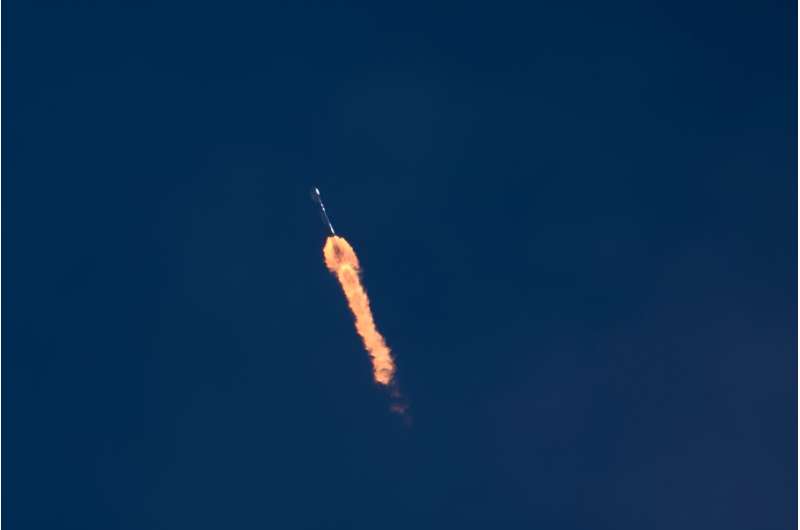
SpaceX’s highly reliable Falcon 9 rocket has experienced a rare failure that means the latest batch of the company’s Starlink satellites won’t make it into orbit, the company said Friday, as regulators opened an investigation.
The rocket, a prolific launch vehicle that propels both satellites and astronauts into orbit, blasted off from Vandenberg Space Force Base in California on Thursday night, with the first stage performing well and executing its impressive yet now routine droneship landing.
But the second stage developed a liquid oxygen leak, SpaceX said in a statement, leaving it unable to complete a planned second burn.
Though it deployed the 20 Starlink internet satellites it was carrying, they entered an eccentric orbit with a low point of 135 km (83 miles), roughly half of what it needed to be.
The team worked overnight to send commands to the satellites to try to lift their orbit, but were ultimately unsuccessful.
“As such, the satellites will re-enter Earth’s atmosphere and fully demise,” SpaceX said. “They do not pose a threat to other satellites in orbit or to public safety.”
The mishap marks a rare failure for a rocket that has launched successfully 364 times, carrying astronauts, payloads for SpaceX’s commercial clients and thousands of Starlink satellites to orbit.
The last time a Falcon 9 experienced a serious incident was when one blew up on the launchpad in September 2016.
And in June 2015, the second stage of a Falcon 9 disintegrated two minutes after lift-off, resulting in the loss of important equipment bound for the International Space Station.
The Federal Aviation Administration said in a statement it was “requiring an investigation” to determine the root cause of the latest event, identify corrective actions and prevent it from happening again.
SpaceX must submit a report before it can be issued a “return to flight,” meaning the next scheduled resupply of the International Space Station on July 19 is likely to be delayed, as is the next crewed launch on July 31 for the private Polaris Dawn mission.
“SpaceX has an incredible track record with Falcon 9. I can say from personal experience they are very transparent when issues arise,” Jared Isaacman, the billionaire businessman behind Polaris Dawn tweeted.
“As for Polaris Dawn, we will fly whenever SpaceX is ready.”
The mishap notably comes as the first crew of Boeing’s problem-plagued Starliner spaceship are stuck waiting for ground teams to give a green light for them to return from the ISS.
© 2024 AFP
Citation:
SpaceX Falcon 9 rocket experiences rare failure (2024, July 12)
retrieved 12 July 2024
from https://phys.org/news/2024-07-spacex-falcon-rocket-rare-failure.html
This document is subject to copyright. Apart from any fair dealing for the purpose of private study or research, no
part may be reproduced without the written permission. The content is provided for information purposes only.







